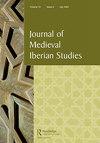维京雇佣兵在加利西亚的活动
IF 0.4
2区 历史学
0 MEDIEVAL & RENAISSANCE STUDIES
引用次数: 1
摘要
摘要维京人与伊比利亚半岛不同地区的互动在中世纪的书面资料中被描述为海盗、暴力和令人恐惧。然而,维京-伊比利亚互动最明显的一面是敌对的,这并不意味着没有发生其他形式的互动。与散居海外的维京人一样,也发生了复杂的贸易、交流和合作关系。在这篇文章中,我将分析一种非暴力互动:雇佣军活动。为了做到这一点,我将回顾三个案例研究,展示斯堪的纳维亚雇佣军在加利西亚的服务。我将强调有必要将挪威-加利西亚的接触理解为持续和多方面的,并强调机会主义在定义维京人与加利西亚关系中的作用。本文章由计算机程序翻译,如有差异,请以英文原文为准。
Viking mercenary activity in Galicia
ABSTRACT The interaction of viking groups with different parts of the Iberian Peninsula was characterised in the medieval written sources as piratic, violent and feared. However, that the most visible face of viking-Iberian interaction was hostile does not mean that other forms of interaction did not occur. Like anywhere else in the viking diaspora, complex relationships of trade, exchange and collaboration also took place. In this article, I will analyse one kind of non-violent interaction: mercenary activity. In order to do so, I will review three case-studies that showcase Scandinavian mercenary services in Galicia. I will emphasise the necessity to understand Norse-Galician contact as constant and multifaceted and underline the role of opportunism in defining viking relationships with Galicia.
求助全文
通过发布文献求助,成功后即可免费获取论文全文。
去求助
来源期刊

Journal of Medieval Iberian Studies
MEDIEVAL & RENAISSANCE STUDIES-
CiteScore
1.20
自引率
20.00%
发文量
24
 求助内容:
求助内容: 应助结果提醒方式:
应助结果提醒方式:


